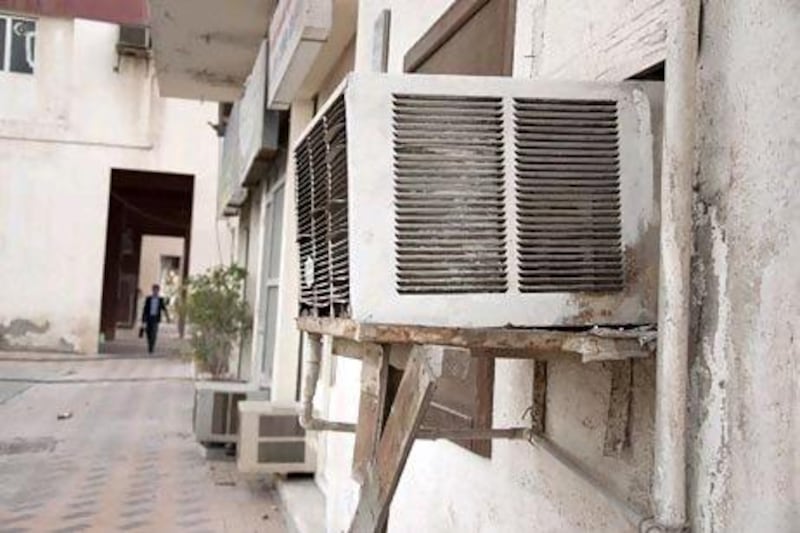I first visited the Arabian Gulf one August, in Oman, staying in an ancient guest house. The air conditioning sounded like a jet engine, and I had to turn it off to sleep.
Then the intense heat would inevitably wake me by 6am. But I should have been grateful: in countries with unreliable electricity such as Iraq and Yemen, and even during power cuts in Sharjah, people must manage as their ancestors did.
Dubai, Abu Dhabi and Doha would not exist without air conditioning.
Large, cosmopolitan cities, centres for finance and tourism, demand an equable indoor climate through the fierce Gulf summers. But the energy and environmental impacts of air conditioning mean the region needs to rethink keeping cool.
By one estimate, the world's energy consumption for air conditioning could rise 10 times by the middle of the century. Global warming means a hotter Gulf climate, requiring even more cooling.
Mohammed Badri, the director of the Emirates Authority for Standardisation and Metrology, indicated last year that 70 per cent of all electricity used in the UAE was for air conditioning. The peak demand during a summer's day may be three times that of a winter's night, demanding a fleet of power stations that stand idle for much of the year.
Meeting the demand for cooling without combusting money or the environment requires a four-pronged strategy.
First is to get the market right. Writing in the Financial Timesthis month, the consultancy Booz & Company pointed to the advantages of district cooling, where cold water is provided by a central plant and circulated around several buildings.
Booz estimated it could save the equivalent of about 200,000 barrels of oil per day in the GCC by 2030.
District cooling can be much more efficient and cheaper than individual systems, but it has gained a bad reputation in Dubai because of excessively high charges.
Some developers overestimated demand as properties remained empty during the financial crisis, then tried to recover their upfront costs from a smaller number of tenants.
The Booz authors rightly pointed to the distortion caused by subsidised electricity: with rates in most Gulf cities (though not Dubai) set well below the cost of generation, there is no reward for choosing a more efficient air-conditioning system.
But the Financial Times article advocated regulating district cooling as a utility, like power or water.
With Middle Eastern utility companies not renowned for innovation or efficiency, this would just perpetuate and expand the existing problems.
The answer is the opposite: market-based energy pricing, and true competition in cooling services.
Second is to maximise efficiency. Mr Badri's authority is introducing labelling to eliminate the most energy-intensive units. Cleaning air filters, improving insulation, running chillers only when needed and other simple operations can cut electricity use by 30 per cent or more.
Third is to enlist technology that avoids the rampant fuel consumption and environmental damage of today's air-conditioning methods.
Solar power is the obvious one - with panels that can produce both ice and hot water pioneered by companies such as Jordan's Millennium Energy Industries. Daniel Zywietz, the Dubai-based managing director at the clean-energy investor Ambata Capital, is promoting systems driven by geothermal heat from deep underground.
And fourth is to reconsider the whole pattern of urban design.
Of course, the vast metal-and-glass towers, and the dispersed villas, that sprung up during the boom will not go away. But work in Abu Dhabi, especially at Masdar City, shows how to modernise the principles of urban design that made the old town where I stayed in Oman liveable.
Air conditioning is a marvellous invention. But it needs rethinking to ensure it does not consume the Gulf cities it made possible.
Robin Mills is the head of consulting at Manaar Energy, and the author of The Myth of the Oil Crisis and Capturing Carbon
twitter: Follow and share our breaking business news. Follow us
iPad users can read the digital edition of business section as it was printed via our e-reader app. Click here





